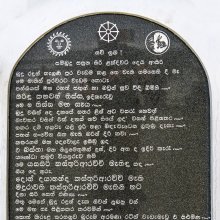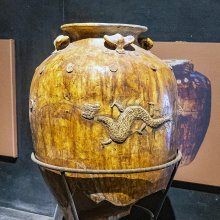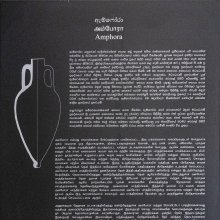Vash, Vaś, Vas, Vaṣ, Vāś, Vās: 12 definitions
Introduction:
Vash means something in Hinduism, Sanskrit, Hindi, biology. If you want to know the exact meaning, history, etymology or English translation of this term then check out the descriptions on this page. Add your comment or reference to a book if you want to contribute to this summary article.
The Sanskrit terms Vaś and Vaṣ and Vāś can be transliterated into English as Vas or Vash, using the IAST transliteration scheme (?).
Images (photo gallery)
(+3 more images available)
In Hinduism
Vyakarana (Sanskrit grammar)
Source: Wikisource: A dictionary of Sanskrit grammar1) Vas (वस्).—pres. participle affix वसु (vasu) substituted for शतृ (śatṛ) applied to the root विद् (vid); e.g. विद्वस् (vidvas), cf. विदेः शतृर्वसुः (videḥ śatṛrvasuḥ) P.VII. l.36;
2) Vas.—perf. part. affix क्वसु (kvasu) substituted for the general affix लिट् (liṭ) mostly in Vedic Literature, but in specific cases in spoken language; e. g. see सेदिवस्, शुश्रुवस्, उपेयिवस् (sedivas, śuśruvas, upeyivas) cf. P III.2. 107-9. See क्वसु (kvasu).
3) Vaś (वश्).—Short term (प्रत्याहार (pratyāhāra)) for conso. nants from व (va) in हयवरट् (hayavaraṭ) to the mute श् (ś), in जवगडदश् (javagaḍadaś) i.e. all semi-vowels excepting य् (y), and the fifth, the fourth and the third class consonants; cf. नेड् वशि कृति (neḍ vaśi kṛti) cf.P.VII.2.8.

Vyakarana (व्याकरण, vyākaraṇa) refers to Sanskrit grammar and represents one of the six additional sciences (vedanga) to be studied along with the Vedas. Vyakarana concerns itself with the rules of Sanskrit grammar and linguistic analysis in order to establish the correct context of words and sentences.
Biology (plants and animals)
Source: Google Books: CRC World Dictionary (Regional names)Vash in India is the name of a plant defined with Acorus calamus in various botanical sources. This page contains potential references in Ayurveda, modern medicine, and other folk traditions or local practices It has the synonym Acorus calamus auct. non L. (among others).
Example references for further research on medicinal uses or toxicity (see latin names for full list):
· Species Plantarum (1753)
· Izvestiia Akademii Nauk Belorusskoi SSR: Seriia Biologicheskikh Nauk (1985)
· Pharmazie. (2006)
· Journal of Ethnopharmacology (1990)
· Acta Facultatis Rerum Naturalium Universitatis Comenianae, Botanica (1976)
· Botaniceskjij Žurnal SSSR (1985)
If you are looking for specific details regarding Vash, for example side effects, pregnancy safety, extract dosage, health benefits, chemical composition, diet and recipes, have a look at these references.

This sections includes definitions from the five kingdoms of living things: Animals, Plants, Fungi, Protists and Monera. It will include both the official binomial nomenclature (scientific names usually in Latin) as well as regional spellings and variants.
Languages of India and abroad
Sanskrit dictionary
Source: DDSA: The practical Sanskrit-English dictionaryVaś (वश्).—2 P. (vaṣṭi, uśita)
1) To wish, desire, long for; निःस्वो वष्टि शतं शती दशशतम् (niḥsvo vaṣṭi śataṃ śatī daśaśatam) Śānti 2.6; अमी हि वीर्यप्रभवं भवस्य जयाय सेनान्यमुशन्ति देवाः (amī hi vīryaprabhavaṃ bhavasya jayāya senānyamuśanti devāḥ) Kumārasambhava 3.15; Ś.7.26; वष्टि भागुरिरल्लोपमवाप्योरुपसर्गयोः (vaṣṭi bhāgurirallopamavāpyorupasargayoḥ) Sk.
2) To favour.
3) To shine (kāntau).
4) To aver, maintain, declare for; यत् सात्वताः पुरुषरूपमुशन्ति सत्त्वम् (yat sātvatāḥ puruṣarūpamuśanti sattvam) Bhāgavata 12.8.46;1.5.1.
--- OR ---
Vaṣ (वष्).—1 P. (vaṣati) To injure, hurt, kill.
--- OR ---
Vas (वस्).—I. 1 P. (vasati, sometimes vasate, uvāsa, avātsīt, vatsyati, vastum, uṣita)
1) To dwell, inhabit, live, stay, abide, reside (usually with loc.; but sometimes acc.); धीरसमीरे यमुनातीरे वसति वने वनमाली (dhīrasamīre yamunātīre vasati vane vanamālī) Gītagovinda 5.
2) To be, exist, be found in; वसन्ति हि प्रेम्णि गुणा न वस्तुनि (vasanti hi premṇi guṇā na vastuni) Kirātārjunīya 8.37; यत्राकृतिस्तत्र गुणा वसन्ति (yatrākṛtistatra guṇā vasanti); भूतिः श्रीर्ह्रीर्धृतिः कीर्तिर्दक्षे वसति नालसे (bhūtiḥ śrīrhrīrdhṛtiḥ kīrtirdakṣe vasati nālase) Subhāṣ.
3) To spend, pass (as time) (with acc.). -Caus.
1) To cause to dwell, to dwell, lodge, people.
2) To receive hospitably.
3) To dwell, inhabit. -Desid. (vivatsati) To wish to dwell. -II. 2 Ā. (vaste) To wear, put on; वसने परिधूसरे वसाना (vasane paridhūsare vasānā) Ś.7.21; Śiśupālavadha 9.75; R.12.8; Kumārasambhava 3.54;7.9; Bhaṭṭikāvya 4.1. -Caus. (vāsayati-te) To cause to put on. -III. 4 P. (vasyati)
1) To be straight.
2) To be firm.
3) To fix. -IV. 1 P. (vasayati) To dwell; L. D. B. -V. 1 U. (vāsayati-te)
1) To cut, divide, cut off.
2) To love.
3) To take, accept.
4) To hurt, kill.
5) To offer. -VI. 1 U. (vasayati-te) To scent, perfume.
--- OR ---
Vāś (वाश्).—I. 4 Ā. (vāśyate, vāśita)
1) To roar, cry, scream, shriek, howl; hum (as birds), sound in general; (śivāḥ) तां श्रिताः प्रतिभयं ववाशिरे (tāṃ śritāḥ pratibhayaṃ vavāśire) R.11.61; Śiśupālavadha 18.75,76; Bhaṭṭikāvya 14.14,76.
2) To call.
--- OR ---
Vās (वास्).—I. 1 U. (vāsayati-te)
1) To scent, perfume, incense, fumigate, make fragrant; वासिताननविशेषितगन्धा (vāsitānanaviśeṣitagandhā) Kirātārjunīya 9.6; प्रकटितपटवासैर्वासयन् काननानि (prakaṭitapaṭavāsairvāsayan kānanāni) Gītagovinda 1; Uttararāmacarita 3.16; R.4.74; Meghadūta 2; Ṛtusaṃhāra 5.5.
2) To steep, infuse.
3) To spice, season. -II. 4 Ā. See वाश् (vāś).
Source: Cologne Digital Sanskrit Dictionaries: Shabda-Sagara Sanskrit-English DictionaryVaś (वश्).—r. 2nd cl. (vaṣṭi) 1. To desire, to will, to wish. 2. To shine.
--- OR ---
Vaṣ (वष्).—r. 1st cl. (vaṣati) To kill or hurt.
--- OR ---
Vas (वस्).—[(au)auvasa] r. 1st cl. (vasati) To dwell or inhabit. r. 2nd cl. (vaste) To cover with dress, to wear as clothes. r. 10th cl. (vasayati-te) 1. To perfume. 2. To dwell. (vāsayati-te) 1. To be affectionate, to love. 2. To cut or divide. 3. To kill. 4. To accept. (ira, u) iravasu r. 4th cl. (vasyati) To be straight, to be unbending; literally or figuratively. With adhi prefixed, To sit upon, to occupy. With upa, To fast. With ni, 1. To dwell in or inhabit. 2. To dress. With pra, To dwell abroad. With sam, To cohabit. Caus. (vāsayati-te) 1. To cause to live or dwell. 2. To put on, to dress. With nis, To drive away, to expel, to banish. With pra, To exile.
--- OR ---
Vāś (वाश्).—[(ṛ)vāśṛ] r. 4th cl. (vāśyate) 1. To sound. 2. To cry as a bird. 3. To call. 4. To howl, to growl, to roar.
--- OR ---
Vās (वास्).—r. 10th cl. (vāsayati-te) 1. To introduce another quality, but especially fragrant odors, to perfume, to incense, to fumigate, &c. 2. To steal, to infuse. 3. To season, to spice. (ṛ) vāsṛ r. 4th cl. (vāsyate) To sound, especially as a bird.
Source: Cologne Digital Sanskrit Dictionaries: Benfey Sanskrit-English DictionaryVaś (वश्).—ii. 2 (vaśmi, uśvas), [Parasmaipada.] To desire, to will, Śak. [distich] 179;
— Cf.
--- OR ---
Vaṣ (वष्).—baṣ BaṢ, i. 1, [Parasmaipada.] To hurt or kill.
--- OR ---
Vas (वस्).—i. 1, [Parasmaipada.] (in epic poetry also [Ātmanepada.], [Rāmāyaṇa] 2, 48, 21). 1. To dwell, Mahābhārata 1, 749; sometimes with vāsam, [Mānavadharmaśāstra] 2, 242;
— With the prep. adhi adhi, 1. To inhabit, [Rāmāyaṇa] 1, 34, 46. 2. To dwell, [Uttara Rāmacarita, 2. ed. Calc., 1862.] 55, 16. Comp. ptcple. of the pf. pass. samayādhyuṣita, see s. v.
— With anu anu, 1. To dwell with (with acc.), [Rāmāyaṇa] 2, 37, 26. 2. To inhabit, [Bhaṭṭikāvya, (ed. Calc.)] 5, 75.
— With antar antar (adv.), To dwell in, [Śiśupālavadha] 3, 9.
— With ā ā 1. To dwell with (with acc.), [Rāmāyaṇa] 2, 50, 2. 2. To inhabit, Mahābhārata 3, 8032. 3. To have an adulterous connection with (acc.), [Mānavadharmaśāstra] 8, 374. 4. To dwell, Mahābhārata 3, 2014. 5. To undergo, to assume, [Mānavadharmaśāstra] 3, 2. [Causal.] 1. To receive, [Rāmāyaṇa] 2, 12, 101. 2. To inhabit, Mahābhārata 3, 12188.
— With adhyā adhi-ā, To inhabit, Mahābhārata 1, 5512.
— With samā sam -ā, To inhabit, [Rāmāyaṇa] 2, 54, 41. [Causal.] To pitch, [Hitopadeśa] 84, 11, M.M. (samāvāsita-ka- ṭaka, adj. Having pitched his camp).
— With ud ud, [Causal.] To expel, [Pañcatantra] 47, 6.
— With upa upa, 1. To inhabit. 2. To fast, [Mānavadharmaśāstra] 2, 220. upoṣita, 1. Fasted. 2. Who has fasted, [Pañcatantra] 199, 12. 3. Fasting. n. Fast, [Mānavadharmaśāstra] 5, 155. [Causal.] To cause to fast, to instruct to fast, [Rāmāyaṇa] 2, 5, 4.
— With ni ni, 1. To dwell, [Pañcatantra] 160, 23; [Mānavadharmaśāstra] 2, 24. 2. To pass (the night), Mahābhārata 4, 276.
— With adhini adhi-ni, To dwell near (with acc.), [Bhartṛhari, (ed. Bohlen.)] 3, 77.
— With saṃni sam-ni, To dwell, Mahābhārata 3, 16777.
— With nis nis, To dwell abroad, Mahābhārata 3, 915(?). [Causal.] 1. To expel, Mahābhārata 2, 2644; [Pañcatantra] iii. [distich] 270. 2. To banish, [Uttara Rāmacarita, 2. ed. Calc., 1862.] 112, 6.
— With pari pari, paryuṣita, 1. One who has passed the night, [Pañcatantra] 40, 13. 2. Stale, not fresh, [Mānavadharmaśāstra] 4, 211; [Pañcatantra] ii. [distich] 102 (of a flower); Häberl. Anthol. 6, 4. 3. Insipid, [Nala] 12, 13; Mahābhārata 3, 2856.
— With pra pra, 1. To dwell abroad, [Rāmāyaṇa] 2, 36, 8. 2. To order to dwell abroad, [Rāmāyaṇa] 2, 41, 6. proṣita, 1. Departed, [Daśakumāracarita] in
— With vipra vi-pra, To dwell abroad, [Mānavadharmaśāstra] 2, 132. vipro- ṣita, Having been abroad, [Rāmāyaṇa] 2, 103, 26. [Causal.] To banish, [Mānavadharmaśāstra] 8, 219.
— With prati prati, 1. To dwell near, [Hitopadeśa] 110, 2. 2. To dwell, [Pañcatantra] 32, 23.
— With vi vi, 1. To dwell, to pass, [Rāmāyaṇa] 1, 23, 23. 2. To pass away, [Pañcatantra] 130, 7. [Causal.] 1. To dismiss, Mahābhārata 3, 8277. 2. To banish, [Mānavadharmaśāstra] 8, 123.
— With sam sam, 1. To dwell, or to live with (with the acc.), [Mānavadharmaśāstra] 11, 190. 2. To cohabit (acc.), [Mānavadharmaśāstra] 9, 77.
— Cf. [Gothic.] visan; [Anglo-Saxon.] wesan, ed-wist, werig; [Old High German.] wesan and werên, wonên; [Anglo-Saxon.] wunian; [Latin] Vesta, vestibulum, verna; probably
--- OR ---
Vas (वस्).— (the original form of uṣ, q. cf.), base of the present, uccha, i. 6, [Parasmaipada.] To shine,
— With the prep. vi vi, vyuṣṭa, see separately.
— Cf. [Gothic.] uhtvo, see uṣas.
--- OR ---
Vas (वस्).—ii. 2, [Ātmanepada.] 1. To wear, as clothes, [Mānavadharmaśāstra] 1, 101; 2, 41. 2. To put on, [Mānavadharmaśāstra] 4, 116.
— With ni ni, To put on, [Nala] 10, 29. [Causal.] To put on, Mahābhārata 3, 2631.
— With pra pra, To put on, [Rāmāyaṇa] 2, 100, 30.
— With prati prati, [Causal.] To dress, Mahābhārata 2, 2502.
— With vi vi, [Causal.] To put on, Mahābhārata 2, 2520.
— Cf. [Gothic.] vasjan (to wear), vasti; [Anglo-Saxon.] werian; [Latin] vestis; (= ved. vasman, [Rigveda.] iv. 13, 4),
--- OR ---
Vas (वस्).—i. 4, [Parasmaipada.] To be unbending.
--- OR ---
Vas (वस्).—i. 10, vāsaya, [Parasmaipada.] 1. † To love. 2. To cut. 3. † To take, or to offer, or to kill.
--- OR ---
Vas (वस्).—[-vas] 3., adj. Wearing, [Raghuvaṃśa, (ed. Stenzler.)] 11, 16.
--- OR ---
Vāś (वाश्).—and vās VĀS, i. 4, [Ātmanepada.] (in epic poetry i. 1, [Parasmaipada.] [Ātmanepada.], Mahābhārata 3, 10493; [Nala] 11, 20; 1, 8433; also [Mṛcchakaṭikā, (ed. Stenzler.)] 143, 13), To cry, to howl, ll. ll. Ptcple. of the pf. pass. vāśita, n. The cry of birds or animals. f. tā, 1. A woman. 2. A female elephant. Frequent. vāvaśya, To cry repeatedly, Mahābhārata 6, 111.
— With the prep. ud ud, To bewail, [Bhaṭṭikāvya, (ed. Calc.)] 3, 32.
--- OR ---
Vās (वास्).—i. 10 (rather a [denominative.] derived from vāsa), [Parasmaipada.] (in epic poetry also [Ātmanepada.], Mahābhārata 3, 24), To introduce another quality, to perfume, [Gītagovinda. ed. Lassen.] 1, 35. Ptcple. of the pf. pass. vāsita. 1. Made fragrant, [Uttara Rāmacarita, 2. ed. Calc., 1862.] 63, 4. 2. Filled with fragrance, Böhtl. Ind. Spr. 551. see s. v. Comp. Su-, adj. well perfumed, [Ṛtusaṃhāra] 1, 3.
— With the prep. adhi adhi, To adorn, [Vikramorvaśī, (ed. Bollensen.)] [distich] 127.
— Cf. vāś.
Source: Cologne Digital Sanskrit Dictionaries: Cappeller Sanskrit-English DictionaryVaś (वश्).—vaṣṭi vivaṣṭi vavaṣṭi vaśati be eager, will, desire, long for, order, command; aver, declare to be (2 [accusative]). [Causative] vaśayati subdue.
--- OR ---
Vas (वस्).—1. ([enclitic] [pronoun] of 2^nd [person or personal]) you.
--- OR ---
Vas (वस्).—2. ucchati [participle] uṣṭa (—°) shine, light up, dawn; bring or drive away (dūre) by shining. [Causative] vāsayati cause to shine.
--- OR ---
Vas (वस्).—3. vaste put on, don, enter, assume (an appearance). [Causative] clothe, dress in, cover with ([instrumental]), [Middle] refl.
--- OR ---
Vas (वस्).—4. vasati vasate [participle] uṣita q.v. (& uṣṭa) stay in a place, [especially] over night (±rātrim), dwell, live, rest on (eye) or in ([locative]); [with] dūratas keep away; [with] sukham be at ease or comfortable. [Causative] vāsayati, te cause to stay (over night), lodge; confine in ([locative]), stop, detain, keep, support.
--- OR ---
Vāś (वाश्).—vāśati vāśate vāśyate vāśati vāśate vāśyati [participle] vāśita (q.v.) bleat, low, roar, cry (of birds). [Causative] vāśayati, te cause to bleat etc.; [Middle] sound loudly. [Intensive] vāvaśyate howl, croak, sound loudly. anu & pratyanu low after or in return. abhi bleat or bellow at ([accusative]). prati the same. sam (also [Intensive]) bleak etc. (together).
Source: Cologne Digital Sanskrit Dictionaries: Monier-Williams Sanskrit-English Dictionary1) Vaś (वश्):—[class] 2. [Parasmaipada] ([Dhātupāṭha xxiv, 71]) vaṣṭi, (1. [plural] uśmasi, or śmasi, [Ṛg-veda]; 3. [plural] uśanti, [ib.]; p. uśat, uśāna and uśamāna, [ib.]; [class] 1. vaśati and [class] 3. vivaṣṭi [also vavaṣṭi], 2. sg. vavakṣi, [ib.]; [perfect tense] vāvaśuḥ, śe; p. śāna, [ib.]; uvāśa, ūśuḥ [grammar]; [Aorist] avASit, [ib.]; 2. sg. vaśīh, [Mahābhārata] Prec. uśyāt [grammar]; [future] vaśitā, śiṣyati, [ib.]),
—to will, command (p. uśamāna, ‘having at command’), [Ṛg-veda; Atharva-veda];
—to desire, wish, long for, be fond of, like (also with [infinitive mood]), [Ṛg-veda] etc. etc. (p. uśat and uśāna, ‘willing, glad, eager, zealous, obedient’; the former with [superlative degree] uśat-tama, also = charming, lovely, [Bhāgavata-purāṇa] [accord. to [Scholiast or Commentator] also = śuddha, dedīpyamāna, and sv-arcita]);
—to aver, maintain, affirm, declare for (two [accusative]), [Maitrī-upaniṣad; Varāha-mihira’s Bṛhat-saṃhitā; Bhāgavata-purāṇa] :—[Causal] vāśayati ([Aorist] avīvaśat), to cause to desire etc.;
—to get in one’s power, subject, [Catalogue(s)] :—[Desiderative] vivaśiṣati [grammar] [Intensive] vāvaśyate, vāvaśīti, or vāvaṣṭi, [ib.];—p. vāvaśāna, ‘willing, eager’ [Ṛg-veda]cf. [Greek] ἑκών, for φεκων, ‘willing.’
2) Vaṣ (वष्):—(also written baṣ) [class] 1. [Parasmaipada] vaṣati, to hurt, strike, kill, [Dhātupāṭha xvii, 40.]
3) Vas (वस्):—1 (encl.) [accusative] [dative case] [genitive case] [plural] of 2nd [person] [pronoun] (cf. [Pāṇini 8-1, 21, 24 etc.]), [Ṛg-veda]; etc.
4) 2. vas (a Vedic root connected with √1. uṣ q.v.; not in [Dhātupāṭha]) [class] 6. [Parasmaipada], ucchati ([perfect tense] uvāsa, ūṣuḥ, [Ṛg-veda] etc.; [Aorist] avāt [?] [Atharva-veda]; avasran, [Ṛg-veda]; [Conditional] avatsyat, [Śatapatha-brāhmaṇa]; [Vedic or Veda] [infinitive mood] vastave, -uṣi),
—to shine, grow bright ([especially] applied to the dawn), [Ṛg-veda];
—to bestow by shining upon ([dative case]), [ib. i, 113, 7];
— (with dūre) to drive away by shining, [ib. vii, 77, 4] :
—[Causal] vāsayati, to cause to shine, [Ṛg-veda]
5) cf. vasar in vasar-han; [Greek] ἔαρ for φεσαρ; [Latin] vēr etc.
6) 3. vas [class] 10. [Parasmaipada] vāsayati ([Aorist] avīvasat), to love;
—to cut off;
—to accept, take;
—to offer;
—to kill (ni-vāsita, killed), [Dhātupāṭha xxxiii, 70] (only with [preposition]; See pari-√vas; but [according to] to some the [imperative] vasiṣva [Ṛg-veda viii, 70, 10] and uṣa, ‘a lover’ [x, 95, 5], and vasiṣṭha [ib. 17] belong also to this root, which has developed an obscene meaning = [Greek] κεντέω, futuere).
7) 4. vas [class] 2. [Ātmanepada] ([Dhātupāṭha xxiv, 13]) vaste ([imperative] vasiṣva, [Ṛg-veda]; vaddhvam, [Kauśika-sūtra]; p. vasāna, once usāna and usamāna, [Ṛg-veda]; [perfect tense] vavase, [Śiśupāla-vadha]; vāvase, p. sāna, [Ṛg-veda]; [Aorist] avasiṣṭa, [ib.]; [future] vasitā [grammar]; vasiṣyate, [ib.]; vatsyati, [Harivaṃśa 11206]; [infinitive mood] vasitum, [Mahābhārata; Rāmāyaṇa]; [indeclinable participle] vasitvā, [Manu-smṛti; Bhāgavata-purāṇa]; -vasya, [Mahābhārata]),
—to put on, invest, wear, (clothes etc.), assume (a form etc.), enter into, [Ṛg-veda] etc. etc.:—[Causal] vāsayati, te ([Passive voice] vāsyate), to cause or allow to put on or wear (clothes), clothe ([Ātmanepada] ‘one’s self’) with ([instrumental case]), [Ṛg-veda; Gṛhya-sūtra and śrauta-sūtra; Manu-smṛti] :—[Desiderative] vivasiṣate [grammar]:—[Intensive] vāvasyate, vāvasti[ib.]
8) cf. [Greek] ἕννυμι for ϝεσ-νυμι; [Latin] vestis; [Gothic] wasjan; [Anglo-Saxon] werian; [English] wear.
9) a (ifc.), clothed in, wearing (e.g. preta-cūvara-vas, ‘wearing the garments of dead men’), [Raghuvaṃśa]
10) 5. vas [class] 1. [Parasmaipada] ([Dhātupāṭha xxiii, 36]) vasati (mc. also te; [perfect tense] uvāsa, ūṣuḥ, [Ṛg-veda] etc. etc.; p. vāvasāna, [Ṛg-veda i, 46, 13]; -vāsāṃ cakre, [Upaniṣad]; [Aorist] avātsīt, [Atharva-veda]; avāksam, [Aitareya-brāhmaṇa] [where it is artificially connected with vāc]; avāstam, [Upaniṣad]; [future] vastā [grammar]; vatsyati, te, [Brāhmaṇa] etc.; vasiṣyati, [Mahābhārata]; [infinitive mood] vastum, vasitum, [Mahābhārata] etc.; [indeclinable participle] uṣitvā, [Brāhmaṇa]; uṣṭvā, [Mahābhārata]; -uṣya, [Brāhmaṇa] etc.),
—to dwell, live, stop (at a place), stay ([especially] ‘overnight’, with or without rātrim or rātrīs), [Ṛg-veda] etc. etc.;
—to remain, abide with or in (with [locative case] of [person]; [locative case] or [accusative] of place, [especially] with vāsam or vasatim), [Śatapatha-brāhmaṇa] etc. etc.;
—to remain or keep on or continue in any condition (with a pp., e.g. with channa, ‘to continue to be covered’ [Kātyāyana-śrauta-sūtra]; or with an [accusative], with brahmacaryam, ‘to practise chastity’ [Aitareya-brāhmaṇa]; or with an [adverb] e.g. with sukham, ‘to live pleasantly or at ease’; with or without dūratas, ‘t° keep aloof’), [Taittirīya-saṃhitā] etc. etc.;—to have sexual intercourse with ([locative case]), [Harivaṃśa];
—to rest upon ([locative case]), [Subhāṣitāvali];
—to charge or entrust with ([instrumental case]), [Harivaṃśa];
— [class] 10. [Parasmaipada] vasayati, to dwell, [Dhātupāṭha xxxv, 84, e] :—[Passive voice] uṣyate ([Aorist] avāsi), to be dwelt etc., [Mahābhārata; Kāvya literature] etc.:—[Causal] vāsayati, te (cf. [Pāṇini 1-3, 89]; [Aorist] avīvasat, [Maitrāyaṇī-saṃhitā] :
—[Passive voice] vāsyate, [Brāhmaṇa], ti, [Mahābhārata]), to cause to halt or stay (overnight), lodge, receive hospitably or as a guest, [Śatapatha-brāhmaṇa; Mahābhārata] etc.;
—to cause to have sexual intercourse with ([locative case]), [Matsya-purāṇa];
—to let anything stand overnight (with tisro, [scilicet] ratrīs, ‘three nights’), [Kauśika-sūtra];
—to cause to wait, keep in suspense, [Ṛg-veda];
—to delay, retard, [Kāmandakīya-nītisāra];
—to cause to exist, preserve, [Śatapatha-brāhmaṇa];
—to cause to be inhabited, populate (a country), [Hitopadeśa];
—to put in, place upon ([locative case]), [Mahābhārata; Harivaṃśa; Kāvya literature] (anadhyāyam mukhe, to put restraint on the mouth, refrain from speaking);
—to produce, [Sarvadarśana-saṃgraha] :—[Desiderative] vivatsati, to wish to dwell, [Śatapatha-brāhmaṇa] :—[Intensive] vāvasyate, vāvasti, to remain, be in, be engaged in [Monier-Williams’ Sanskrit-English Dictionary]
11) cf. [Gothic] wisan ; [German] wësan, ge-wesen, war etc.; [Anglo-Saxon] wësan; [English] was, were.
12) 6. vas (only in [genitive case] vasām), [probably] either ‘an abode’ or ‘a dweller’ [Ṛg-veda v.2, 6.]
13) 7. vas (only vasiṣva, [anu] -vāvase, vāvasāna, and vastos), to rush or aim at, attack, [Ṛg-veda viii, 70, 10] (cf. under √3 vas); [viii, 4, 8; i, 51, 3; vi, 11, 6] (?); [i, 174, 3].
14) 8. vas (also written bas) [class] 4. [Parasmaipada] vasyati, to be or make firm, [Dhātupāṭha xxxiii, 70.]
15) Vāś (वाश्):—[class] 4. [Ātmanepada] ([Dhātupāṭha xxvi, 54]) vāśyate ([Epic] also vāśyati, [Vedic or Veda] and [Epic] also vāśati, te; [perfect tense] vavāśe, śire; in [Ṛg-veda] also vāvaśre and p. vāvaśāna; [Aorist] avāśiṣṭa, [Brāhmaṇa]; [future] vāśitā, vāśiṣyate [grammar]; [infinitive mood] vāśitum, [ib.]; [indeclinable participle] vāśitvā, -vāśya, [Varāha-mihira’s Bṛhat-saṃhitā]),
—to roar, howl, bellow, bleat, low (as a cow), cry, shriek, sing (like a bird), sound, resound, [Ṛg-veda] etc. etc.:—[Causal] vāśayati ([Aorist] avavāśat, in [Ṛg-veda] also avīvaśat, avīvaśanta), to cause to roar or low or resound or thunder, [Ṛg-veda];
— ([Ātmanepada]) to roar or sound aloud, [ib.] :—[Desiderative] vivāśiṣate [grammar]:—[Intensive] vāvāśyate ([varia lectio] rārāśyate, [Mahābhārata]), vāvaṣṭi ([imperfect tense] [Aorist] avāvaśanta, vāvaśanta, avāvaśītām; p. vāvaśat),
—to roar or scream or sound aloud, [Ṛg-veda] ([vāś is sometimes wrongly written vās.])
16) Vās (वास्):—1. vās See ni- √5. vas.
17) 2. vās [class] 10. [Parasmaipada] ([Dhātupāṭha xxxv, 32]; perhaps only [Nominal verb] [from] next) vāsayati ([Epic] also te; [Aorist] -avavāsat), to perfume, make fragrant, scent, fumigate, incense, steep, [Mahābhārata; Kāvya literature etc.]
Source: Cologne Digital Sanskrit Dictionaries: Yates Sanskrit-English Dictionary1) Vaś (वश्):—(lu) vaṣṭi 2. a. To desire.
2) Vaṣ (वष्):—vaṣati 1. a. To kill or hurt.
3) Vas (वस्):—(ai, au) vasati 1. a. To dwell or inhabit. (la) 2. d. To dress, wear. (ka) 10. a. To be kind; to cut; kill; accept. (ya, ira, u) 4. a. To be unbending. With adhi to sit upon, occupy; with upa, to fast; with ni, to inhabit, to dress; with pra, to sojourn; with sam, to cohabit.
4) Vāś (वाश्):—(ya, ṛ, ṅa) vāśyate 4. d. To sound; to cry as a bird; to call.
Source: DDSA: Paia-sadda-mahannavo; a comprehensive Prakrit Hindi dictionary (S)Vas (वस्) in the Sanskrit language is related to the Prakrit words: Vasa, Vāsa.
[Sanskrit to German]
Sanskrit, also spelled संस्कृतम् (saṃskṛtam), is an ancient language of India commonly seen as the grandmother of the Indo-European language family (even English!). Closely allied with Prakrit and Pali, Sanskrit is more exhaustive in both grammar and terms and has the most extensive collection of literature in the world, greatly surpassing its sister-languages Greek and Latin.
Hindi dictionary
Source: DDSA: A practical Hindi-English dictionary1) Vash in Hindi refers in English to:—(nm) power; control; subjugation; used as a suffix to mean obliged by, compelled by (as [karyavasha, snehavasha); ~varti] under control/ sway, subjugated; -[ka] under control, under the authority (of); -[calana] to exercise control/sway (over); to have a say; —[mem karana] to tame, to bring under control/subjugation;—[mem hona] to be under the control/authority (of)..—vash (वश) is alternatively transliterated as Vaśa.
2) Vas in Hindi refers in English to:—(nm) habitation, dwelling, residence; fragrance, aroma; ~[bhumi] homestead..—vas (वास) is alternatively transliterated as Vāsa.
...
Nepali dictionary
Source: unoes: Nepali-English DictionaryVash is another spelling for वश [vaśa].—n. power; dominion;
Nepali is the primary language of the Nepalese people counting almost 20 million native speakers. The country of Nepal is situated in the Himalaya mountain range to the north of India.
See also (Relevant definitions)
Starts with (+16): Vasa, Vasaga, Vasaka, Vasani, Vasanuga, Vashabhoga, Vashadhyaka, Vashadi, Vashadyaka, Vashagamana, Vashagamin, Vashagatva, Vashajata, Vashakara, Vashakaraka, Vashakari, Vashakriya, Vashaku, Vashalobha, Vashamakha.
Query error!
Full-text (+905): Pravas, Avas, Vasi, Anuvas, Adhivas, Prativas, Parivas, Samvas, Udvas, Vasa, Abhivash, Adhivasana, Vasura, Suvas, Nivas, Adhivasa, Parivasa, Vasita, Vasaka, Nirvas.
Relevant text
Search found 155 books and stories containing Vash, Vaas, Vaś, Vas, Vaṣ, Vāś, Vās; (plurals include: Vashes, Vaases, Vaśs, Vases, Vaṣs, Vāśs, Vāses). You can also click to the full overview containing English textual excerpts. Below are direct links for the most relevant articles:
Yogashikha Upanishad (critical study) (by Sujatarani Giri)
Part 1 - Introduction (to the practice of Yoga) < [Chapter 5 - Nature of Yoga practice in Upaniṣad]
Part 4.6 - Dhāraṇā (fixed attention) < [Chapter 1 - Introduction]
Part 6.6 - Schools of Yoga (6) Mantrayoga < [Chapter 1 - Introduction]
Skanda Purana (by G. V. Tagare)
Chapter 41 - The Genesis of the Name Kuśasthalī < [Section 1 - Avantīkṣetra-māhātmya]
Chapter 41 - Kinds of Sins; Procedure of Śiva Worship; Rules of Good Conduct < [Section 2 - Kaumārikā-khaṇḍa]
Chapter 17 - Manifestation of Vāsudeva < [Section 9 - Vāsudeva-māhātmya]
Women in the Atharva-veda Samhita (by Pranab Jyoti Kalita)
25. Goddess Uṣas < [Chapter 4 - Female Deities and the Glorification of Women in the Atharvaveda]
Devi Bhagavata Purana (by Swami Vijñanananda)
Garga Samhita (English) (by Danavir Goswami)
Verse 5.7.42 < [Chapter 7 - The Killing of Kuvalayāpīḍa]
Rig Veda (translation and commentary) (by H. H. Wilson)





